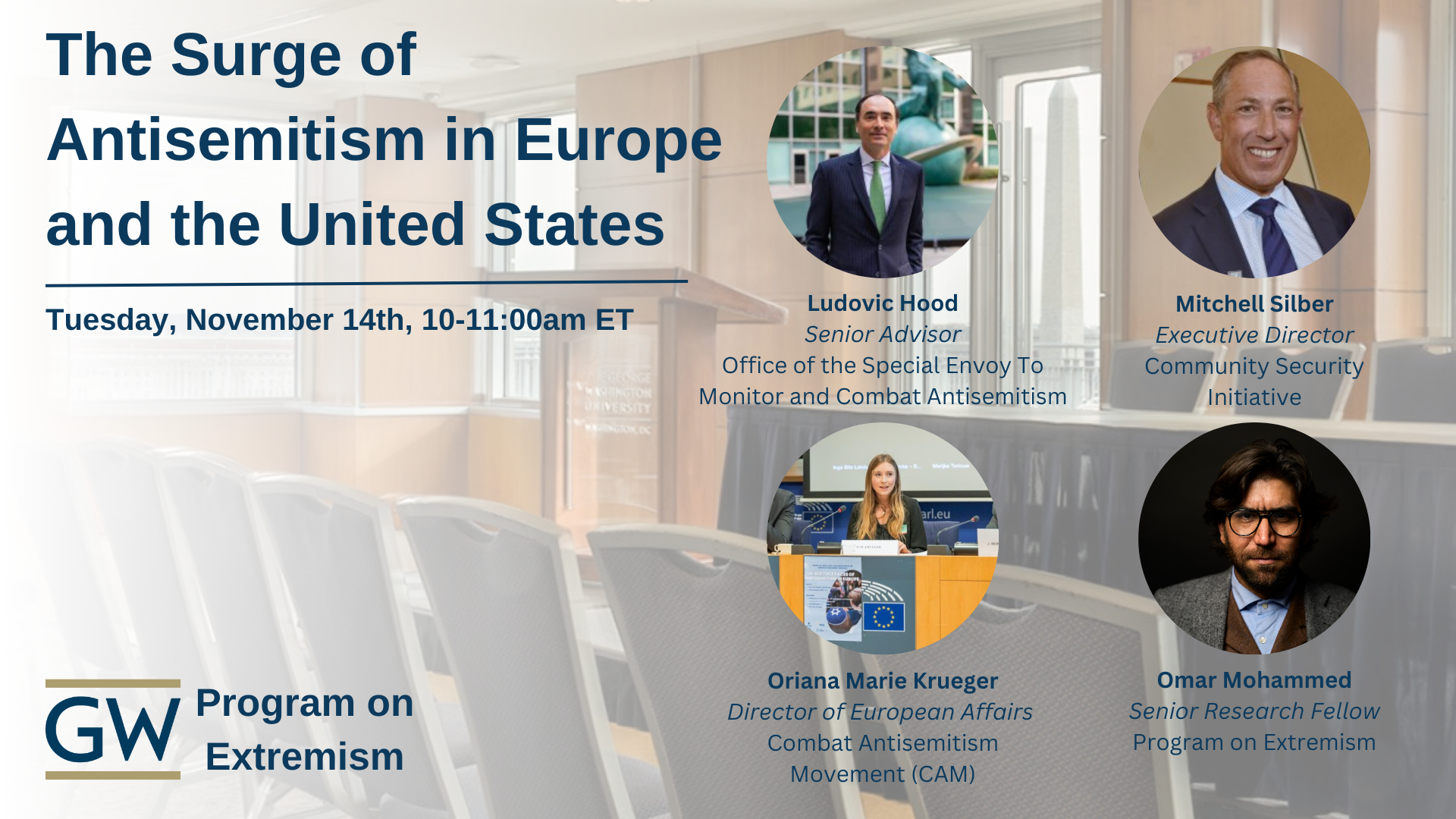The Surge of Antisemitism in Europe and the United States

On November 14th at 10 AM US ET, the Program on Extremism hosted a virtual event on "The Surge of Antisemitism in Europe and the United States." Authorities and civil society organizations across multiple countries have documented a significant increase in antisemitic incidents following the attack by Hamas on southern Israel on October 7. This escalation is not merely rhetorical but has also manifested in physical threats, thereby reigniting concerns regarding the security of Jewish communities, particularly in the United States and Europe. Within these regions, Jewish communities have articulated increasing anxieties about their safety. The pressing issue at hand provokes a series of critical questions: How can society collectively address this resurgence in antisemitism? What forms of dialogue and discourse are requisite for a meaningful conversation? What responsibilities should governmental and non-governmental organizations bear in this context?
This discussion was moderated by Senior Research Fellow Omar Mohammed and featured insights from:
- Ludovic Hood, Senior Advisor for the Office of the U.S. Special Envoy To Monitor and Combat Antisemitism
- Mitchell Silber, Executive Director of the Community Security Initiative
- Oriana Marie Krueger, Director of European Affairs at Combat Antisemitism Movement (CAM)
Ludovic Hood opened the panel by providing insights on current policies and approaches to counter antisemitism. He began by explaining how antisemitic rhetoric and incidents in Europe have slowly climbed over the past 20-25 years, but dramatically surged following the October 7th attacks in southern Israel by Hamas. Over the years, European governments have implemented a number of initiatives to combat antisemitism. The first was an effort to develop a shared definition of antisemitism, now the International Holocaust Remembrance Alliance (IHRA) definition. Some European governments have also appointed national coordinators or special envoys to support the European Union (EU) Coordinator on Combating Antisemitism and Fostering Jewish Life, Katharina von Schnurbein. The next line of effort was the 2021 launch of the EU strategy to combat antisemitism. Finally, European countries implemented measures to safeguard Jewish sites and places of worship. With regard to the United States, the Department of State’s Office of the Special Envoy To Monitor And Combat Antisemitism regularly attend consulates and embassies to discuss best practices to counter the threat of antisemitism. The Special Envoy also communicates closely with regional bureaus at the Department of State to decipher appropriate action, whether that be public statements of condemnation or behind-the-scenes diplomacy. In May, the United States also put forth its first strategy to counter antisemitism which includes concrete action items for almost every federal department and agency. The Department of Education is also working to make filing complaints under the 1964 Civil Rights Act a smoother process for any student who experiences antisemitism, or any other kind of prejudice, on American campuses. Hood concluded by emphasizing the importance of building alliances and bringing people from all walks of life together when fighting against hate.
Oriana Marie Krueger dove deeper into the antisemitic landscape in Europe. Despite the denouncement of the Hamas attacks by most European leaders, all across the continent Jewish communities are concerned to leave their homes when large demonstrations are using antisemitic slogans and calling for the destruction of Israel. In the wake of the Hamas attacks and subsequent war, it is evident that antisemitism is the binding of the far-left, far-right, and Islamist ideologies. She emphasized that this is not to say that antisemitism is not also seen in the so-called “center.” For example, in the United Kingdom the majority of antisemitism has been associated with far-left protests, while in Italy it has been mostly associated with those holding moderate political views. In Germany, one of the European countries with the largest population of Jews, the Palestinian NGO Samidoun handed out sweets to celebrate the attacks by Hamas. In France, there have been people accused of spray painting Stars of David on Jewish homes, and some of those arrested say they have been paid by Russians to do so. France has the largest Jewish community in Europe, but also the largest Muslim community, so Krueger believes that this may have been a destabilization attempt by Russia to further divide the communities.
To round out the panel, Mitchell Silber discussed security measures that ensure the safety for the Jewish community in the United States. Silbers' organization, the Community Security Initiative, created a program in the wake of the Tree of Life shooting that involves regional security directors working with every Jewish institution (schools, synagogues, museums, etc.) in New York to provide active shooter training, improve physical security, and liaise with local law enforcement. The Community Security Initiative also employs a team of intelligence analysts that comb through antisemitic posts on sites such as Telegram and 4chan to determine which posts could develop into violent offline action, and flag those posts for law enforcement. Silber noted how the level of anxiety in the Jewish community is comparable to the weeks and months following September 11th, 2001, but the current threat is different. Hamas does not have the means nor the power to attack the United States via an external operations arm. The acute threat today is Hamas-inspired lone actors who are “ingesting hate” online and may want to take action for the cause. Overall, the panelists agreed that antisemitism is not just an issue that occurs in the wake of an international conflict- it is a 2,000 year old problem. Only by involving diverse communities in education and discussion about the Jewish Community can we hope to bridge existing divides and prevent antisemitic violence.

